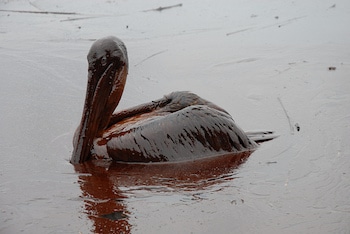It has now been four years since the Deepwater Horizon oil rig exploded, killing 11 men and leaking an estimated 210 million gallons of crude oil into the Gulf of Mexico. The media attention has disappeared, but the oil that continues to wash up along the Gulf Coast is a constant reminder to those who call this area home of BP’s toxic legacy.
In spite of the massive evidence of fraud and malfeasance on behalf of BP, Transocean, and Halliburton, only one set of criminal charges was filed in the four years since the disaster. Those charges were filed against BP engineer Kurt Mix, who has since been found guilty of obstruction of justice for deleting text messages about the true size of the oil leak. However, Mix has yet to be sentenced, and the judge is currently weighing a defense motion to dismiss the charges altogether.
The three companies involved — BP, Transocean, and Halliburton — have paid criminal fines for their actions, money that is supposed to go to states and individuals for the damage they suffered as a result of the spill. But thanks to the dirty tricks employed by BP, those payments have slowed to a trickle.
Late last year, as their fines and legal payments began to exceed their original expectations, BP launched a massive PR blitz to demonize “greedy” oil spill victims who were seeking compensation. The oil giant took out full-page ads in major newspapers like the Washington Post claiming that the spill claims process was riddled with fraud, and that the company was being raked over the coals by fraudulent payments. The company successfully managed to stall payments for a while, with a judge recently ordering the company to continue making payments.
But for all of their crying over allegedly unfair payments, BP has made out like a bandit in the years since the company destroyed the Gulf of Mexico. For starters, they avoided charges of manslaughter for criminal negligence that led to the death of the 11 rig workers. Since the spill, the company has pulled in a net income of $38 billion over the last three years, and was recently granted the ability to resume drilling in the Gulf of Mexico. For BP, everything has returned to normal.
While things might be going well for BP, the vast Gulf ecosystem that their oil poisoned is still suffering. The toxic mix of crude oil and Corexit (the chemical dispersant used to help clean up the spill) has settled to the bottom of the Gulf, disrupting the food chain from the bottom to the top.
To begin with, shrimp and small crustacean populations have dwindled as a result of the spill, and many of the remaining specimens are turning up mutated and poisoned. Further up the food chain, bottlenose dolphins have been washing up dead on the shore, and large predator fish populations have developed heart problems as a direct result of the chemicals from the oil and dispersant.
Coastal ecosystems have not fared much better. As DeSmog’s Julie Dermansky pointed out, insect populations in marshlands along the Gulf Coast are falling at alarming rates, disrupting the coastal food chains.
BP is great, victims are still waiting for compensation, and the ecosystem could take decades to recover. But at least the Obama administration has taken the necessary steps to make sure another disaster like this never occurs, right?
Wrong.
In the four years since the blowout, little has changed. In spite of the overwhelming cry from federal agencies about the need to enact stricter rules governing offshore drilling, along with their reports that laid out the exact steps to take, the administration has done nothing.
The best critique of the administration’s lack of action comes from a former administration official, Elizabeth Birnbaum, who served as the director of the Minerals Management Service during the disaster:
We would never have imagined so little action would be taken to prevent something like this from happening again. But, four years later, the Obama administration still has not taken key steps recommended by its experts and experts it commissioned to increase drilling safety. As a result, we are on a course to repeat our mistakes. Making matters worse, the administration proposes to expand offshore drilling in the Atlantic and allow seismic activities harmful to ocean life in the search for new oil reserves.
Following the spill, the administration promised that it would do what was necessary to make drilling as safe as possible. A presidential commission recommended numerous measures to increase drilling safety. The Coast Guard, the Department of the Interior and the National Academy of Engineering subsequently identified more problems that contributed to the spill. Though some recommendations have been acted upon, including restructuring the regulatory agency that oversees drilling and increasing training and certification for government drilling rig inspectors, threats remain.
But it gets even worse. As Birnbaum pointed out in her New York Times op-ed, the Obama administration is deliberately ignoring the recommendations of federal reports:
Administration officials promised an immediate response to the N.A.E. report, including regulations to set new standards for blowout preventers by the end of 2012. Today, 16 months after that deadline and four years after the blowout, we still have not seen even proposed rules. Deepwater drilling continues in the gulf. New leases are being offered by the government and sold to energy companies each year. Yet the N.A.E. report warned that a blowout in deep water may not be controllable with current technology.
So far this year, the Obama administration has opened up another 112 million acres of the Gulf of Mexico for exploitation by the dirty energy industry, making the risk of another Deepwater Horizon disaster a very real possibility.
The fact that the administration has failed to enact any of the safeguards that have been recommended make another disaster more than just a possibility — it is only a matter of time.
Subscribe to our newsletter
Stay up to date with DeSmog news and alerts







